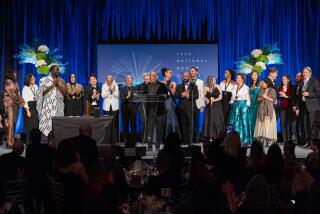Nobel for Arab a Reminder of a Wider Literary World
- Share via
When the world’s most prestigious literary prize went to an Egyptian Thursday, it lifted hopes that Arab literature--considered a vital social force in the Middle East--will gain a broader audience in the West.
But it also served as a reminder that the Nobel Prize for Literature often goes to writers who for various reasons are unknown in America.
Naguib Mahfouz, the first Arab to win the Nobel literary award, has a towering reputation in his own country, said Muhammad Siddiq, an Arab literature expert at the University of Washington who has met the Egyptian novelist.
“I think it’s really overdue, not only for him but also for modern Arabic literature,” Siddiq said.
In Arab societies, literature has been “a catalyst for progress and change” that has “made possible the transition from the traditional secluded sort of way of life into the global village,” he explained.
But while high hopes were being placed on the honor bestowed on the 76-year-old novelist and retired civil servant, Mahfouz himself apparently was not deviating from his longstanding routine of spending Thursday nights out with friends, his daughter Hoda said.
Reached by phone at the family apartment in Cairo, she said her father was nowhere in sight and reporters who had been waiting to catch him had given up their stakeout. On his nights out, the septuagenarian is seldom home before 1 a.m.
Not Legend-building Earlier in the day, Mahfouz told reporters he attributed the award partly to hard work and good luck. He also said a French translation of his trilogy about Egypt before and after Nasser’s revolution may have made his work accessible to the Nobel committee.
His daughter indicated that Mahfouz’s reference to hard work was not a bit of legend-building. Typically, her father writes and reads from the early afternoon until about 9 p.m.
Arab literature scholar Siddiq characterized Mahfouz as a “very shrewd” and a “very cunning sort of man” who uses his hearing problem to his advantage. Recalling a meeting with Mahfouz when in Egypt, Siddiq said the novelist ignored his question even though he sat next to him; Mahfouz, however, heard and responded loudly to a comment from across the room.
Mahfouz’s work has been intimately connected with the history of his own country, Siddiq said. In a paper by the University of Washington scholar, Mahfouz’s more than 50 books are often described as being prompted by events such as an army intelligence scandal in the 1970s and disenchantment with Nasser’s revolution in the 1950s.
After Egypt’s defeat in the 1967 Arab-Israeli war, Mahfouz’s “response to the incredible magnitude of the defeat was a spate of surrealistic and hallucinatory short stories,” Siddiq wrote.
But the historical passions that inspired Mahfouz have not been enough to bring him renown in the West.
That was the evidence found by Carlin Romano, a literary editor and fellow at Columbia University’s Gannett Center for Media Studies, who recently researched the history of Nobel literary prizes for a magazine article.
Often American critics respond to the selection of a writer such as Mahfouz with the attitude “we haven’t heard of him; therefore he’s not important,” Romano said.
Four Pages Is ‘Ridiculous’
The perspective may be culturally ingrained, he said, noting that one guide to modern world literature contains almost 1,400 pages but devotes only four pages to Arab literature and two lines to Mahfouz.
“I can see having two lines on this guy, but the four pages is ridiculous,” he said.
Mahfouz’s American obscurity was confirmed by a check with Los Angeles bookstores.
Representatives of several stores--including Fowler Brothers in Los Angeles, Dutton’s in Brentwood, the Alhambra Bookstore and B. Dalton’s in Hollywood--said they do not carry the author’s works.
None of Mahfouz’s books were in stock at the Pasadena Public Library or the UCLA student bookstore; the 2.5-million volume USC library said it had just one Mahfouz work, in Arabic.
Six of Mahfouz’s titles are distributed in the United States by Columbia University Press, where a representative said the phones were ringing constantly Thursday.
Publicity director Barbara Passman said 400 books were sold quickly after Mahfouz’s prize was announced; the company was ordering more from the publisher, the American University of Cairo Press.
Times Staff Writer Gary Libman also contributed to this story.
More to Read
Sign up for our Book Club newsletter
Get the latest news, events and more from the Los Angeles Times Book Club, and help us get L.A. reading and talking.
You may occasionally receive promotional content from the Los Angeles Times.










